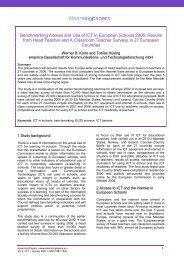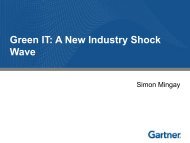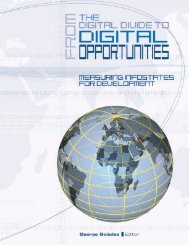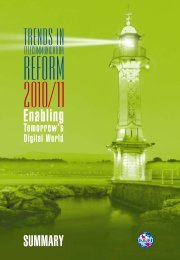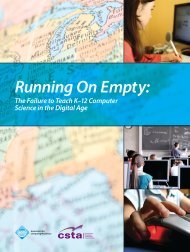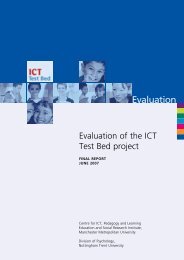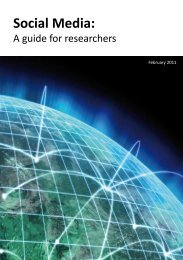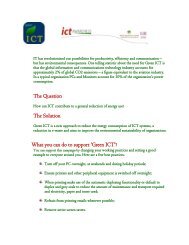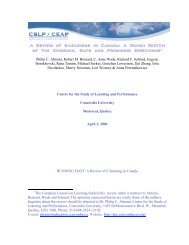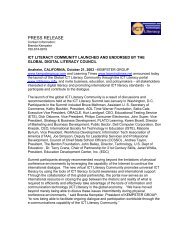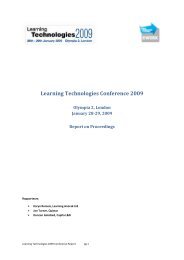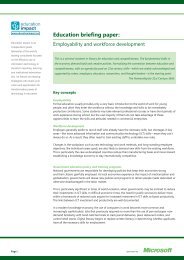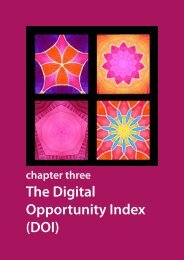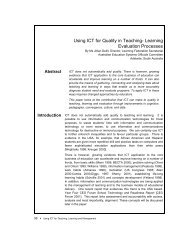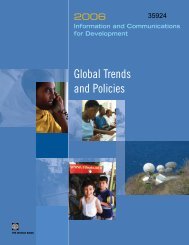147 pages pdf - ICT Digital Literacy
147 pages pdf - ICT Digital Literacy
147 pages pdf - ICT Digital Literacy
Create successful ePaper yourself
Turn your PDF publications into a flip-book with our unique Google optimized e-Paper software.
Still Learning After All These Years (& So You Should Be!)<br />
Chapter 7: Still Learning After All These Years<br />
(and So You Should Be!)<br />
You too need to be a lifelong learner. And as training professionals, you need to put into<br />
practice what you preach to others: schedule time for your e-classes just like you would<br />
with any other learning opportunity, create a comfortable learning space that suits your<br />
needs, ask questions and participate by becoming part of a learning community.<br />
#368: Plan Your e-Time<br />
Learners should set aside the same hour every week, either early in the morning or late in the<br />
day. Send the phone to voicemail for the hour, turn off email.<br />
Bernadette Lawler<br />
McGraw-Hill<br />
#369: Before The Course<br />
Meet with your manager, mentor (if one has been assigned), find out as much as you can about it,<br />
complete any course pre-requisites, ensure you have the correct hardware and software, obtain the course<br />
material and job aids, and schedule a specific time and date to complete the course.<br />
Susan Boyd<br />
Susan Boyd Associates<br />
#370: If At First You Don't Succeed ...<br />
… Try again, you're learning! This is especially true in e-Learning since nearly every mistake we make and<br />
every problem we encounter teaches us as much (or more) than our successes will ever do.<br />
Connie Kreischer-Slingbaum<br />
The Pennsylvania Turnpike<br />
#372: Contract With Yourself<br />
I recommend creating a learning contract. As with any agreement - it enables the student to<br />
really focus on what comes next while keeping the terminal objective in sight. Here are the steps<br />
used for creating a Learning Contract:<br />
1. Personal Goal: The personal goal is a brief statement of what the learner intends to<br />
accomplish via an independent project.<br />
2. Learning Resources: What resources are available to the learner to accomplish the goal?<br />
3. Learning Strategies: For each phase of your project write a description of your planned strategy.<br />
4. Timeline: A list of the steps with dates (start/completion) of each step in the project.<br />
5. Results: Indicate what results you expect from the project.<br />
6. Evaluation Criteria: Describe exactly how the project should be evaluated to determine how<br />
the goal has been accomplished.<br />
Elaine Winters<br />
#373: File As You Go<br />
Emails, web addresses, quotes can all go into resources folders. They are highly searchable<br />
and over time become a valuable resource!<br />
Merrily Schalansky<br />
Lower Hudson Regional Info Center<br />
#374: You Get As Much Out As You Put In<br />
Set aside time for e-Learning and be sure to reflect on it, just like any other learning. And do it in bite-sized chunks.<br />
Ana Karakusevic<br />
BBC Training and Development<br />
701 e-Learning Tips by The MASIE Center www.masie.com 74



